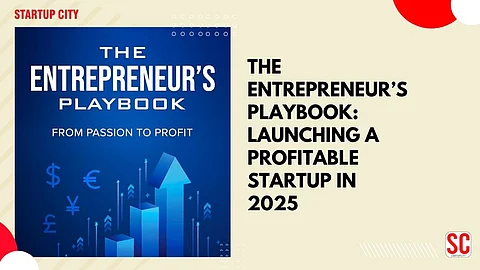

Profitable Startup
It’s 2025. You're sitting in your home office, fueled by ambition and your third cup of coffee. The world is changing faster than ever — AI is booming, markets are shifting, and competition is fierce. But guess what? This is your moment. The perfect time to build something that matters. A business that solves real problems, drives profit, and leaves a legacy.
In my experience working with young CEOs, startup founders, and first-time entrepreneurs, I’ve seen one universal truth: the right strategy can transform an idea into an empire.
So, let me show you exactly how to do it.
Welcome to The Entrepreneur’s Playbook: Launching a Profitable Startup in 2025.
“People don’t buy what you do; they buy why you do it.”
— Simon Sinek
Every profitable startup I’ve studied — from fintechs in Mumbai to edtechs in Bengaluru — started with clarity of purpose. Before you write your business plan or register your company, ask yourself:
What problem am I solving?
Who am I solving it for?
Why am I the right person to solve this?
Pro Tip: Define your founder’s “Why” early. It’ll fuel your mission when the going gets tough (and trust me, it will).
You don’t need a fancy app or an office to start. What you do need is validation.
Build an MVP (Minimum Viable Product): Use tools like Bubble or Notion to create simple prototypes.
Talk to 50 potential users: Seriously, call, message, or meet them. Understand their pain points.
Pre-sell if possible: Platforms like Instamojo or Razorpay make it easy to collect early payments.
Fact: According to CB Insights, 42% of startups fail because there’s no market need. Don't be in that statistic.
Forget big teams. Focus on small, passionate, skilled squads.
The Hustler (That’s likely you): Vision, execution, deals.
The Hacker: Tech development, automation, systems.
The Designer: UX, branding, and visual storytelling.
“If you want to go fast, go alone. If you want to go far, go together.”
— African Proverb
Hire people who believe in your mission, not just your money.
Many entrepreneurs in 2025 are exploring alternative monetization like:
Freemium-to-Premium: Think SaaS startups.
Subscription-Based: Perfect for D2C brands and content businesses.
Commission/Marketplace: Ideal for platforms like edtech, fintech, etc.
Reflect: What revenue model fits your startup? Can it scale sustainably?
Let me be honest: Not every startup needs funding. Sometimes, bootstrapping gives you freedom and focus.
But if your vision is capital-intensive, here’s your cheat sheet:
Angel Investors & Accelerators (e.g., 100X.VC, Venture Catalysts)
Government Grants: Check Startup India schemes
Crowdfunding: Platforms like Ketto, Wishberry
Revenue-Based Financing: Get capital without giving equity
Tip: Build a pitch deck that tells a story, not just data. Investors invest in people before spreadsheets.
Branding isn’t just a logo. It’s how you make people feel.
In 2025, the startups winning are the ones who:
Communicate with authentic storytelling
Have a strong visual identity
Show up consistently on platforms like Instagram, LinkedIn, and YouTube
Use tools like Canva, Adobe Express, and AI-generated branding kits to keep costs low and impact high.
“Your brand is what people say about you when you’re not in the room.”
— Jeff Bezos
If you're building a startup today, you're blessed with game-changing tech.
ChatGPT: For content, idea validation, customer support
Zapier & Make.com: To automate repetitive tasks
Webflow & Glide: Build apps and websites without code
Zoho, Freshworks: CRM & customer service platforms built for Indian startups
Time is your currency. Automate everything you can.
Here’s the secret: Go deep before you go wide.
Get your first 100 loyal customers. Talk to them. Serve them. Learn from them. They’ll be your early evangelists.
Then focus on:
Unit economics: Are you actually making profit per customer?
Customer LTV vs CAC: Are they worth the money you spend to acquire them?
Markets will shift. Tech will evolve. Competitors will rise.
Your agility is your edge.
Build feedback loops. Run quarterly reviews. Pivot when needed — but stay rooted in your mission.
Example: Zomato started as a food blog called Foodiebay before pivoting into a food delivery giant.
We glorify unicorns. But the truth? Most successful entrepreneurs are quiet compounding machines.
Set your sights on:
Monthly revenue targets
Customer happiness scores
Employee well-being and culture
Celebrate:
Your first paying customer
First media mention
First partnership or investor call
These small wins are the heartbeat of your startup journey.
Launching a profitable startup in 2025 isn’t about luck. It’s about clarity, consistency, and courage.
You don’t need to know everything right now. Just take the first step. Then the next. Then the next. The playbook is here. The stage is set.
“The best way to predict the future is to create it.”
— Peter Drucker
Now go create yours.